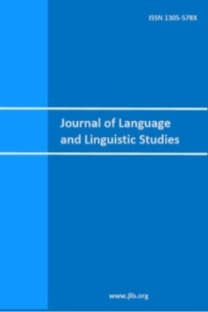Washback effect of Turkish foreign language proficiency exam YDS: A scale development study
Washback effect; foreign language testing; high stake tests; YDS; proficiency tests; test impact; exploratory factor analysis; confirmatory factor analysis
___
Airasian, P. (1994). Classroom Assessment (pp. 18-21). New York: Mc Graw-Hill.Akın, G. (2016). Evaluation of national foreign language test in Turkey. Asian Journal of Educational Research, 4(3), 11-21. Retrieved in March, 2019 from: http://www.multidisciplinaryjournals.com/wp-content/uploads/2016/04/FULLPAPER
Alderson, J.C. (1986). Innovations in language testing. In M. Portal (Ed.), Innovations in language testing: Proceedings of the IUS/NFER Conference (pp. 93-105), Windsor.
Alderson, J.C., & Wall, D. (1986). Does washback exist? Applied Linguistics, 14, 115-129.
Brown, J. D. (1998). Testing in Language Programs. Upper Saddle River. NJ: Prentice Hall Regents.
Büyüköztürk, Ş. (2013). Sosyal bilimler için veri analizi el kitabı. Ankara: Pegem.
Cheng, L., & Curtis, A. (2004). Washback in Language Testing. Retrieved in May, 2019 from: https://www.researchgate.net/publication/277405452_Washback_in_language_testing_Research_contexts_and_methods
Ching, P. Y. (2009). A review of washback and its pedagogical implications. VNU Journal of Science Foreign Languages, 25, 257-263.
Cinkara, E., Tosun, Ö. (2017). Face validity study of a small-scale test in a tertiary level intensive EFL program. B.U. Journal of Faculty of Education, 6(2), 395- 410.
Cohen, R. J., & Swerdlik, M. E. (2013). Psikolojik test ve değerlendirme, testler ve ölçmeye giriş (E. Tavşancıl, Trans.). Ankara: Nobel.
Crocker, L., & Algina, J. (1986). Introduction to classical and modern test theory. USA: CBS Collage Publishers Company.
De Vellis, R. F. (2014). Ölçek geliştirme, kuram ve uygulamalar (T. Totan, Trans.). Ankara: Nobel.
Doğan, İ., & Doğan, N. (2014). Adım adım çözümlü parametrik olmayan istatistiksel yöntemler. Ankara: Detay.
Fish, J. (1988). Responses to mandated standardized testing. Educational Researcher, 18, 27-32.
Green, A. (2007). IELTS washback in context: Preparation for academic writing in higher education. Retrieved in April, 2019 from: http://hosted.jalt.org/test/PDF/Dunkley2.pdf
Green, S. B., & Salkind, N. J. (2008). Using SPSS for Windows and Macintosh: Analysing and Understanding Data. Upper Saddle River: Pearson; Prentice Hall.
Hatipoğlu, Ç. (2016). The impact of the university entrance exam on EFL education in Turkey: Pre-service English language teachers’ perspective. Procedia-Social and Behavioural Sciences, 232, 136-144.
Heaton, J.B. (1988). Writing English Language Tests. Longman Handbook for Language Teachers. Longman.
Kitao, S. K., & Kitao, K. (1996). Testing communicative competence. The Internet TESL Journal, 2(5), 1-6.
Kline, R. B. (2005). Principles and practice of structural equation modelling. New York: The Guilford Press.
Külekçi, E. (2016). A concise analysis of the Foreign Language Examination (YDS) in Turkey and its possible washback effects. International Online Journal of Education and Teaching, 3(4), 303-315. Retrieved in March, 2019 from: http://iojet.org/index.php/IOJET/article/view/141/143
Linn, R. L. (2000). Assessments and accountability. Educational Researcher, 29, 4-16.
McEwen, N. (1995). Introducing accountability in education in Canada. Canadian Journal of Education, 20, 1-17.
Noble, A.J., & Smith, M. L. (1994). Measurement-driven reform: research on policy, practice, repercussion. Tempe: Arizona University.
Özdamar, K. (2013). Paket programlar ile istatistiksel veri analizi. Eskişehir: 2013.
Özmen, K.S. (2011). Washback Effects of Inter University Foreign Language Examination on Foreign Language Competences of Candidate Academics. Novitas Royal (Research on Youth and Language), 5(2), 215-228.
Pearson, I. (1988). Tests as levers for change. Practice and evaluation. London: Springer. (pp. 98-107).
Polat, M. (2018). Akademisyenlerin Yabancı Dil Bilgisi Seviye Tespit Sınavı’nın (YDS) Geçerliğiyle İlgili Tutumlarının Belirlenmesi. Retrieved in March, 2019 from: https://dergipark.org.tr/download/article-file/693327
Şeker, H., & Gençdoğan, B. (2014). Psikolojide ve eğitimde ölçme aracı geliştirme. Ankara: Nobel.
Shohammy, E. (2006). Language Policy. Hidden Agendas and New Approaches. New York: Routledge.
Siegel, S. (1977). Davranış bilimleri için parametrik olmayan istatistikler (Y. Topsever, Trans.). Ankara: Ankara Üniversitesi Basımevi.
Smith, M. L. (1991). Put to the test: The effects of external testing on teachers. Educational Researcher, 20, 8-11.
Vieira, A. L. (2011). Preparation of the analysis. Interactive LISREL in practice. London: Springer.
Wall, D. (1996). Introducing new tests into traditional systems: Insights from general education and from innovation theory. Language testing, 13, 334-354.
Wall, D. (2000). The impact of high-stakes testing on teaching and learning: Can this be predicted or controlled? System, 28, 499-509.
Yavuzer, H., & Göver, D. H. (2012). Akademik personelin yabancı dil durumu ve yabancı dil sınavlarına bakısı: Nevsehir örneği. NEÜ Sosyal Bilimler Enstitüsü Dergisi, 1(2), 136-158.
Yesilyurt, S. (2016). An attempt for the exploration of academicians’ experiences of the standard foreign language tests held in Turkey through metaphors. International Journal of Higher Education, 5(2), 263-274.
- ISSN: 1305-578X
- Yayın Aralığı: Yılda 4 Sayı
- Yayıncı: Hacettepe Üniversitesi
Developing intercultural awareness in language teaching: Insights from EFL lecturers in Turkey
B. Zeynep ÖZIŞIK, Savaş YEŞİLYURT, Dr. Hakan DEMİRÖZ
Learning from reflection: A case of a post-sojourn debriefing workshop with EFL university students
The effect of school type on EFL teachers’ burnout: The case in Turkey
The effects of task-induced involvement load and input modality on incidental vocabulary learning
Cansu KIVRAK, Dilek UYGUN GÖKMEN
Burçak YILMAZ YAKIŞIK, Fatıma Nur FİŞNE, Gonca YANGIN EKŞİ
The prospective EFL teachers' impressions towards teaching styles: Foresights for their professions
Ayfer SU BERGİL, Ayşegül ERÇEVİK
Code-switching in tertiary-level EFL classrooms: perceptions of teachers
